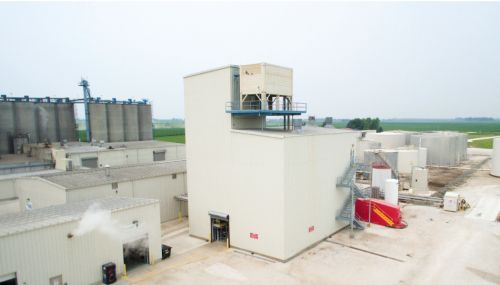All
NYC Looks to Make Its Heating Oil Even Cleaner
by John MacKenna
New York City already uses the cleanest heating oil of any U.S. city or state, and it could switch to an even cleaner blend next year.
Council Member Costa Constantinides, who represents the Astoria section of Queens, last week introduced legislation that would require all oil-heated buildings in the City to use a B5 blend beginning in October 2016. B5 is a blend of 95 percent petroleum heating oil and 5 percent biodiesel.
The new bill would also create a framework to increase that blend level every five years, reaching B20 by 2030. B20 fuel can reduce carbon emissions by up to 40 percent, according to the Council Member.
New York is already the national leader in clean oil heating, with a B2 mandate that has been in effect since 2012. The City also uses biodiesel extensively in city vehicles and uses only ultra low sulfur heating oil, which is mandated throughout New York State. Ultra low sulfur heating oil contains less than 1 percent of the sulfur contained in traditional heating oil and will be the standard in most Northeast states by 2018.
Constantinides is proposing the switch to cleaner heating oil to support the City’s efforts to reduce greenhouse gas (GHG) emissions, which is expressed in another pending bill known as Intro 78. That bill proposes an 80 percent reduction in GHG emissions from all sources by 2050. The City has already committed to reducing GHG emissions by at least 30 percent by 2030 under the terms of the New York City Climate Protection Act that passed in 2007.
“As we move closer to our citywide commitment to reduce carbon emissions by 80 percent by 2050, we must take advantage of all opportunities to get us there,” Constantinides told Oil & Energy. “Increasing biofuel in home heating oil will make our city more sustainable and healthy. Buildings produce over 75 percent of our emissions, and this bill will help reduce those emissions in an innovative way. Increasing our biofuel use to a 5 percent blend in home heating oil would be equivalent to taking 45,000 cars off the road.”
Oil Heating Association Supports Bill
John Maniscalco, CEO of New York Oil Heating Association (NYOHA), praised the legislation. “We applaud Council Member Costa Constantinides for introducing such an environmentally forward-thinking bill that would increase the requirement in heating oil from B2 to B5 for all buildings in New York City and then scale up to B20 – or a 20 percent biodiesel blend,” he said. “We look forward to continuing to work with the New York City Council and the Mayor’s office to lead the City toward a more sustainable future. We are now in our third winter at a B2 bio-fuel standard and it has been an unequivocal success. Now it’s time to move on to B5 blend and inch closer to an eventual goal of B20.”
In a conversation with Oil & Energy, Maniscalco said he foresees no issues in ramping up to B5, but there are still some issues to be ironed out, such as how to strike the right balance between local biodiesel blending and delivering pre-blended fuels to the region. “This is the next logical step. We have to get cleaner and greener,” he said. We have the ability to do that, and we have to do that until we’re better than natural gas.”
Constantinides told Oil & Energy that that an increase in biodiesel blending would create more green jobs in the City. “Twenty thousand restaurants in the City participate in sales of used cooking oil to biodiesel companies,” he said. “There are thousands of jobs in New York City associated with the biodiesel industry. We have to create jobs for the future. New York City is working hard to diversify the tax base.”
Increasing the biodiesel blend rate is also good for homeowners. “They have a cleaner heating system,” Constantinides said, noting that the use of B20 fuel would save the average household $600 due to increased system efficiency.
The Councilman offered high praise for NYOHA. “The Oilheat industry has shown they want to grow with us to be more green and sustainable. We are looking to be more energy efficient, and they are helping us get there.”
Strong Support for Bio
Support for biodiesel initiatives has generally been very strong on the City Council. “We have a bill to mandate biodiesel blends in the city’s ferries, and it has 40 co-sponsors on the 51-member Council,” Constantinides said. The administration of Mayor Bill de Blasio has promised to work with him and fellow Councilman Donovan Richards to increase biodiesel blending, he added.
The biodiesel industry offered strong support for the new Bioheat bill. “We are thrilled Councilman Constantinides has introduced legislation to bring cleaner air and more green jobs to the City through enhanced use of biodiesel,” said Shelby Neal, Director of State Governmental Affairs, National Biodiesel Board. “Climate change is becoming a larger and larger issue, and Councilman Constantinides is positioning himself as an early leader and visionary. Reducing the carbon intensity of the City’s space heating fuel by more than 15 percent would be a major accomplishment.”
Daniel Falcone, Renewable Energy Group’s Biodiesel Sales Manager for the Northeastern United States, said the new legislation would help grow the region’s biodiesel infrastructure. The current B2 mandate drives about 20 million gallons in sales, and that would more than double to approximately 50 million with a new B5 requirement, according to Falcone. At B20, biodiesel demand for heating NYC alone could rise to between 150 million and 170 million gallons. “We can deliver that, especially if they do it in five-year increments,” he said. “I am extremely confident about our ability to meet the need.” REG has already built out a supply infrastructure in Metropolitan New York, with six facilities delivering biodiesel, petroleum and biodiesel blends.
Related Posts
 Why Quality Matters in Your Biofuel Blends
Why Quality Matters in Your Biofuel Blends
Posted on June 25, 2025
 HEAT Show Gears Up
HEAT Show Gears Up
Posted on June 25, 2025
 What’s Next in Boiler Technology
What’s Next in Boiler Technology
Posted on June 25, 2025
 How Intelligent Are Your Integrated Customer Platforms?
How Intelligent Are Your Integrated Customer Platforms?
Posted on June 25, 2025
Enter your email to receive important news and article updates.
